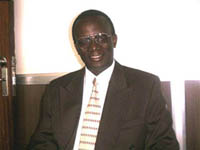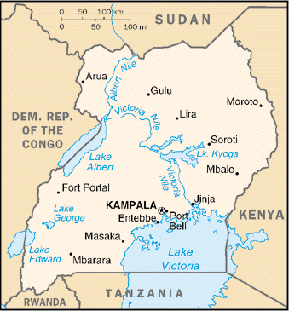|
My first tournament days were another baptism of fire. With no quarters given or taken, the senior players showed us how far we had to go. More tournament experience however brought more improvement and confidence.
Over time, I assumed administrative responsibility at club level as chairman of the UCB chess club and in 1997 I was elected Chairman of Uganda Chess Federation.
TCD: Please tell us when the UCF came into being and when it began to organize and participate in international competitions.
NSIBAMBI: Uganda Chess Federation came into being in 1972. What is significant about this date is that it is the year of the Bobby Fischer - Boris Spassky historic match in Iceland. The publicity accorded to this clash sparked off a fire in the imagination of the few Ugandans who had been previously playing chess as a pastime. They organised themselves into the Uganda Chess Association later to become the Uganda Chess Federation after affiliation with FIDE in 1976.
TCD: Who were some of the first members of the national team and are there any celebratory triumphs in the country's history (any recorded games, pictures)?
NSIBAMBI: The names to remember here are the late Paul Bitarabeho (founding chairman), a Kampala businessman, the late Lawrence Kapanga (founding general secretary) a librarian with Mengo Senior Secondary school in Kampala and Dr. Yusuf Mpairwe (founding vice chairman), a Kampala physician who still practices at the Naguru Medical Laboratory. Uganda has participated in all past Olympiads since 1980 except the 1990 Moscow Olympiad.
Some of the surviving pioneering members of Uganda's 1976 counter-Olympiad team in Tripoli are Matthew Kibuuka, FIDE Master Willy Zabasajja (then aged 19), Dr. Wilson Kisubi, Vincent Lule, John Kiganda and Dr. Yusuf Mpairwe. Other notable veterans in subsequent Olympiads are Dr. George William Zirembuzi, Joachim Okoth, the late Amos Mungyereza (bronze medal in Lucerne 1982, board 6), Silver Kamuhangire, Enoch Barumba and Muhumuza Mpeka.
In the Thessalonica Olympiads (1988), unrated Emmanuel Kabuye playing board 1 nearly caused a sensational upset when he came close to beating Grandmaster Eugene Torre (Philippines). The game ended in a draw. Jerome Bibuld has large collection of pictures that may contain some of these players many of whom he knows by name. More recently in 1996, 16-year-old Geoffrey Makumbi earned Uganda a gold medal on board 6 in Yerevan, Armenia.
|
|


